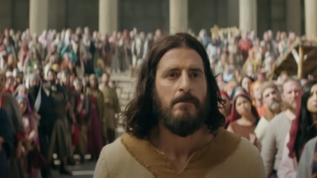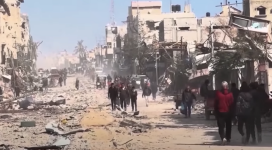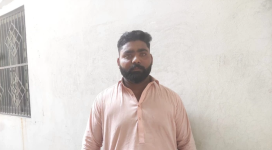Africa is once again facing famine.
By January or February, the world could again be looking at "stick-limbed children and women dying at the side of the road, images not seen since the Ethiopian famine of 1984-85," said Catholic Relief Services executive director Ken Hackett.
Just back from Southern Africa where Zambia, Zimbabwe and Malawi's food-short populations are already severely weakened by the HIV-AIDS pandemic, Hackett said Ethiopia and Eritrea also face a rerun of the early 1980s.
The two immediate problems, said the Catholic Relief Services official who was part of a U.S. Catholic delegation that returned Nov. 4, are that "the world doesn't know about this yet, the word isn't out, and that the U.S. administration's attention is elsewhere." Involvement by the United States is key, as America provides about one-third of all food crisis assistance through the World Food Program.
The U.S. Agency for International Development, often called USAID, reports it has already delivered or pledged more than $275 million in food aid to six countries in Southern Africa since the beginning of this year.
It isn't just Southern Africa going hungry. Serious food shortages are developing in two other world hunger spots: in Afghanistan, and across "a swath" of coffee-growing Central America (see accompanying story).
Almost half of the 30 million people at risk in Southern Africa are in Zimbabwe, where political and economic instability under President Robert Mugabe have worsened a deteriorating situation. Mugabe has forced white farmers off their lands. This disruption, along with the drought and economic mismanagement, signals a potential major hunger disaster scenario.
Hackett was in Africa with a fact-finding delegation that included Tampa-St. Petersburg, Fla., Bishop Robert Lynch, Catholic Relief Services chair; Pensacola-Tallahassee, Fla., Bishop John Ricard, Catholic Relief Services' former chair and the new chair of the U.S. bishops' International Policy Committee; and conference staffers Jerry Powers and Franciscan Fr. Mike Terry.
Crucial and damaging though the famine threat is, the delegation's interests were not limited to hunger worries. Debt relief, African nations' structural needs, and bolstering the voice and activities of African Catholic bishops' conferences were equally on the agenda. There are 116 million Catholics on the continent of 802 million people.
Powers said the U.S. Conference of Catholic Bishops, commonly called the USCCB, under recent International Policy Committee chair Boston Cardinal Bernard Law, made Africa a strong focus in recent years. In 2001, the conference's Social Development and World Peace secretariat issued "A Call to Solidarity with Africa." In March of this year, the statement was followed by a discussion group guideline: "Answering the Call to Solidarity in Africa." Quite simply, the follow-up is simultaneously a plea to and an outline of why U.S. Catholics and parishes should become involved in Africa and African church issues.
The U.S. bishops' own solidarity with Africa comes at a time when key Catholic churches on the continent are beginning to find their public voice. For example, the delegation met with South Africa's Catholic bishops who, Hackett explained, lead a church that "is important now, and even more important to Africa's future. It is a church that has gone through apartheid and through the Truth and Reconciliation Commission era. It has a lot to give in terms of church leadership throughout the continent."
Hackett, an "Africa hand" since the 1960s, said the Catholic voice in Africa is growing, and there is evidence of a new cohesiveness among the episcopal conferences.
"The church in Africa is coming together in positive ways. The bishops in Central Africa -- Rwanda, Burundi, Congo, Uganda -- are sitting down together even when their nations may be batting heads. We're seeing a new solidarity," he said. The Southern African bishops went to civil-war fraught Sudan to stand with the church there.
"We're happy to see that," explained Hackett, "because we're putting money into building the justice and peace capacities of the various bishops' conferences." And he explained the link between the trust that American Catholic agencies and the U.S. bishops are building up, and the expectation that U.S. Catholics will help.
Catholic Relief Services has people in these African countries, he said. "They sit down with the bishops' conferences over a period of time. They ask, 'How can we be of assistance?' 'Have you thought about this?' 'Perhaps we can fund a visit to that place for you.' And we keep pushing an agenda that finds ways to be supportive from the base community level up to the national and regional level."
The U.S. church operates so effectively in Africa, he said, because the trust level is so high.
Consequently, when famine looms, as it now does, he said, there's an expectation that Catholics will be in the front line of assistance. For example, Catholic Relief Services/Malawi has been organizing emergency food response distributions since May. That general distribution -- in a drought-ruined country where agriculture represents 45 percent of the gross domestic product and 90 percent of exports -- was expanded in September and will keep growing, supplies permitting, as the crisis deepens.
What's needed from Americans in general and U.S. Catholics in particular, said Hackett, "is pressure on the U.S. government to keep starvation in Africa clearly in its focus at a time when we have war hanging over our heads here along with financial crisis issues."
By Arthur Jones
arthurjones@attbi.com
-

‘The Chosen’ strikes exclusive streaming deal with Prime Video, season 5 premieres theatrically first
In a major move for faith-based television, The Chosen, the critically acclaimed series depicting the life of Jesus, is set to premiere its highly anticipated fifth season in theaters before streaming exclusively on Amazon’s Prime Video. This new partnership with Amazon MGM Studios marks a significant shift for the series, expanding its global reach and bringing it to millions of new viewers.
-
‘Duck Dynasty’ family faces health challenges: Phil Robertson’s alzheimer’s battle and Miss Kay’s injury
The Duck Dynasty family is leaning on faith as they navigate serious health struggles affecting both Phil and Miss Kay Robertson. While Phil, the Robertson patriarch, is facing Alzheimer’s disease, his wife, Miss Kay, recently suffered a severe leg injury from a fall.
-
One day until the premiere of House of David—What you need to know before watching
Amazon Prime Video’s highly anticipated biblical drama House of David is set to premiere tomorrow(2/27), bringing the epic story of King David to life in a way never seen before. With just a day left before the first episodes are released, here’s everything you need to know before watching.
-
Horror in Congo: ISIS-linked militants behead 70 Christians in church massacre
At least 70 Christians were brutally beheaded in the Democratic Republic of Congo (DRC) in a massacre carried out by Islamist militants affiliated with the Islamic State (ISIS), according to multiple reports from humanitarian organizations and local sources. The attack, which took place in the eastern province of North Kivu, saw victims murdered inside a church, leaving their headless bodies behind as a chilling warning.
-
Newsboys move forward as a quartet after Michael Tait’s departure
After more than a decade as the lead singer of the Newsboys, Michael Tait has officially parted ways with the band, marking a significant shift in the Christian rock group’s lineup. The remaining members—Jeff Frankenstein, Jody Davis, Duncan Phillips, and Adam Agee—have assured fans that they will continue forward, embracing a new season of music and ministry.






